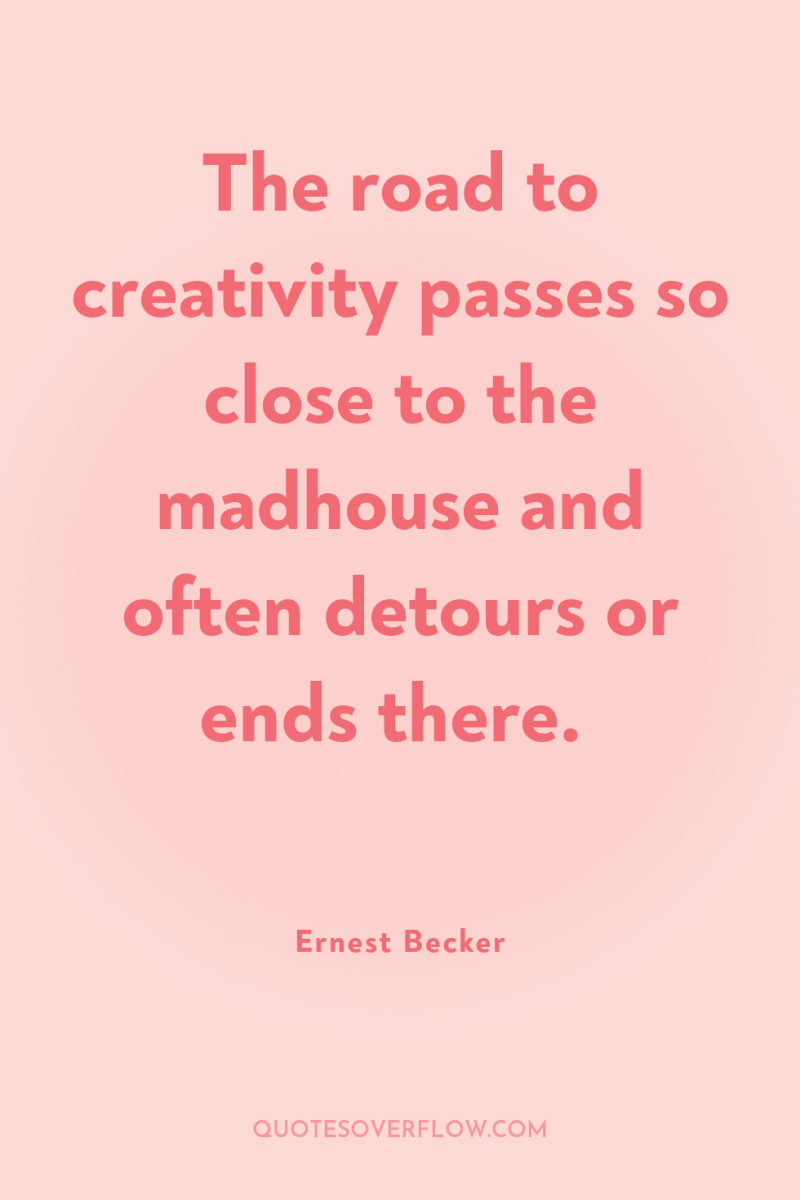
1
The road to creativity passes so close to the madhouse and often detours or ends there.Ernest Becker
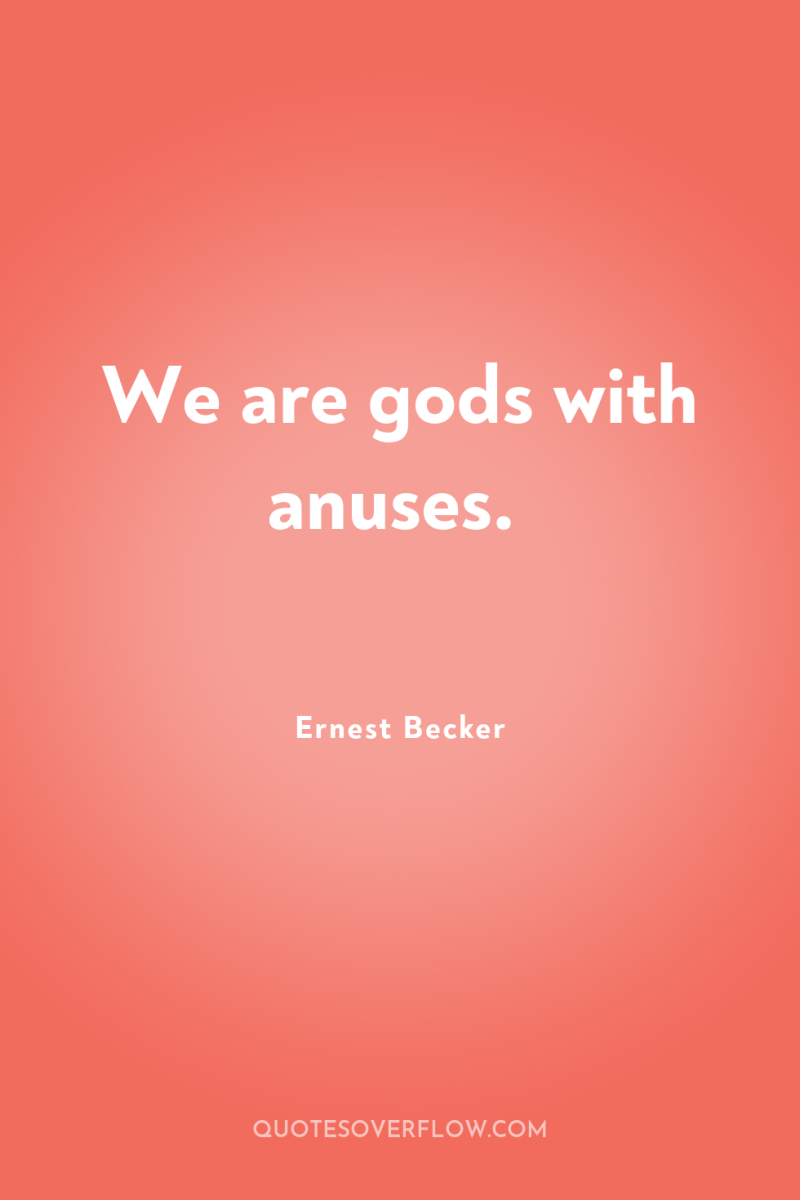
2
We are gods with anuses.Ernest Becker
3
Man is literally split in two: he has an awareness of his own splendid uniqueness in that he sticks out of nature with a towering majesty, and yet he goes back into the ground a few feet in order blindly and dumbly to rot and disappear forever.Ernest Becker
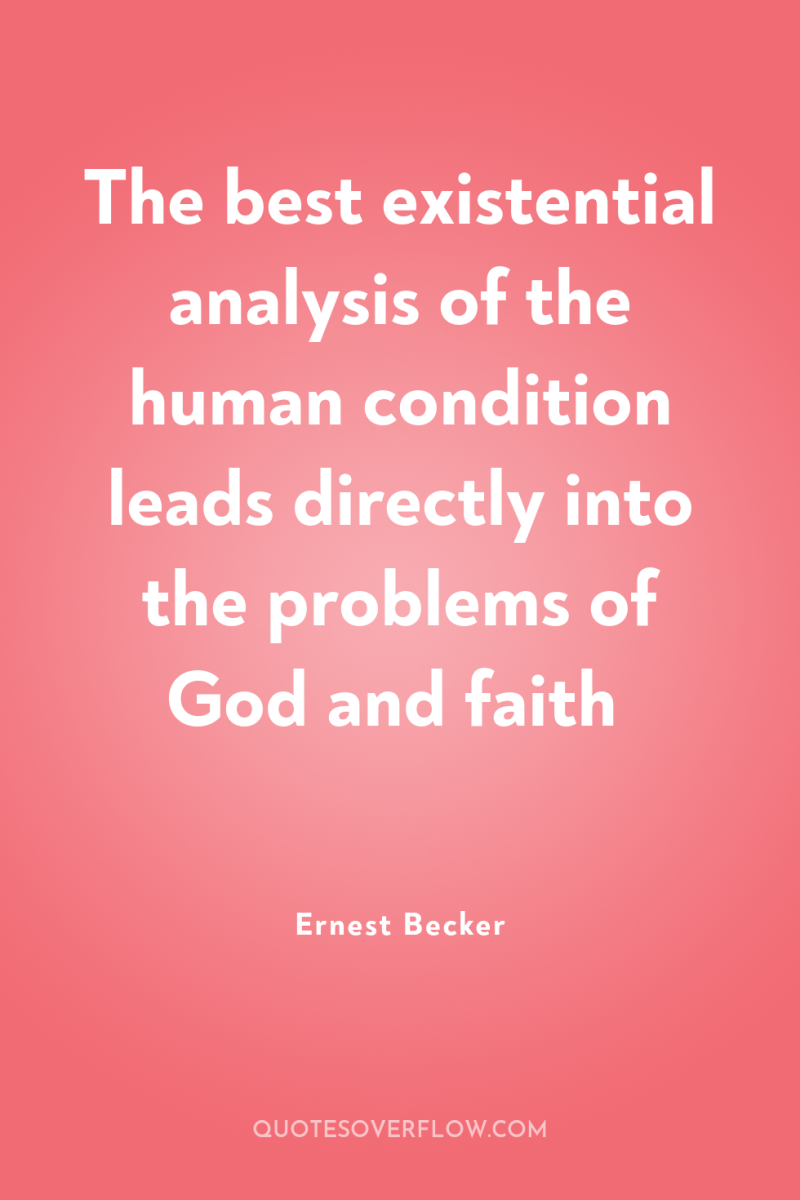
4
The best existential analysis of the human condition leads directly into the problems of God and faithErnest Becker
5
Modern man is drinking and drugging himself out of awarness, or he spends his time shopping, which is the same thing. As awarness calls for types of heroic dedication that his culture no longer provides for him, society contrives to help him forget. In the mysterious way in which life is given to us in evolution on this planet, it pushes in the direction of its own expansion. We don’t understand it simply because we don’t know the purpose of creation; we only feel life straining in ourselves and see it thrashing others about as they devour each other. Life seeks to expand in an unknown direction for unknown reasons. What are we to make of creation in which routine activity is for organisms to be tearing others apart with teeth of all types - biting, grinding flesh, plant stalks, bones between molars, pushing the pulp greedily down the gullet with delight, incorporating its essence into one’s own organization, and then excreting with foul stench and gasses residue. Everyone reaching out to incorporate others who are edible to him. The mosquitoes bloating themselves on blood, the maggots, the killer-bees attacking with a fury and a demonism, sharks continuing to tear and swallow while their own innards are being torn out - not to mention the daily dismemberment and slaughter in “natural” accidents of all types: an earthquake buries alive 70 thousand bodies in Peru, a tidal wave washes over a quarter of a million in the Indian Ocean. Creation is a nightmare spectacular taking place on a planet that has been soaked for hundreds of millions of years in the blood of all creatures. The soberest conclusion that we could make about what has actually been taking place on the planet about three billion years is that it is being turned into a vast pit of fertilizer. But the sun distracts our attention, always baking the blood dry, making things grow over it, and with its warmth giving the hope that comes with the organism’s comfort and expansiveness.Ernest Becker
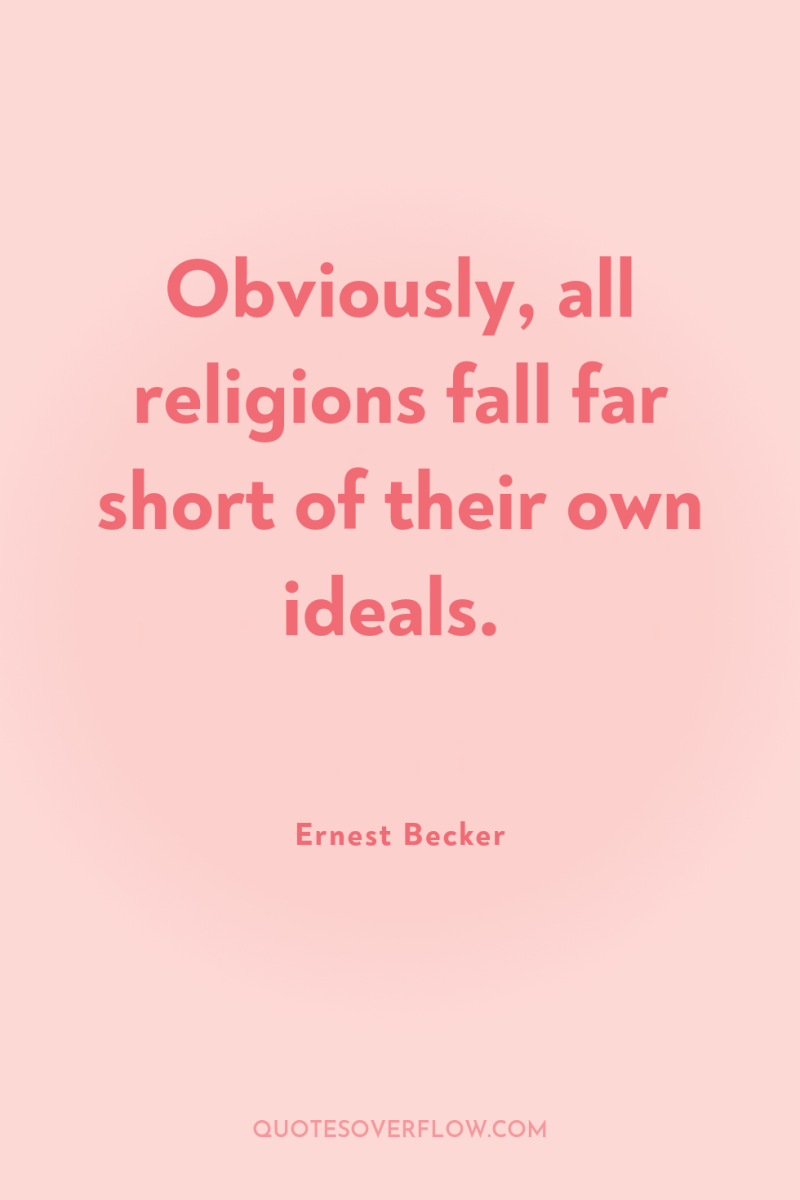
6
Obviously, all religions fall far short of their own ideals.Ernest Becker
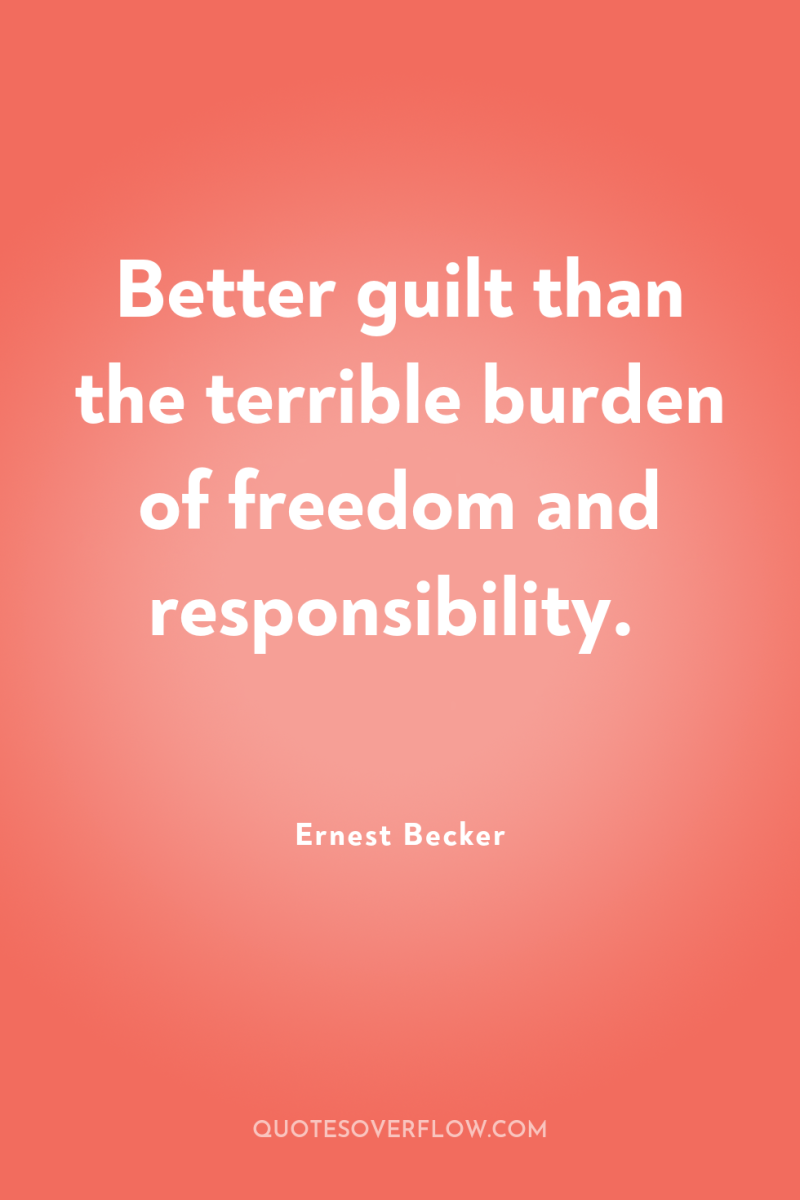
7
Better guilt than the terrible burden of freedom and responsibility.Ernest Becker
8
People were always ready to yield theirwills, to worship the hero, because they were not given a chancefor developing initiative, stability, and independence, said the greatnineteenth-century Russian sociologist Nikolai MikhailovskyErnest Becker
9
[Man] literally drives himself into a blind obliviousness with social games, psychological tricks, personal preoccupations so far removed from the reality of his situation that they are forms of madness, but madness all the same.Ernest Becker
10
Today we are living the grotesque spectacle of the poisoningof the earth by the nineteenth-century hero system of unrestrainedmaterial production. This is perhaps the greatest and most pervasiveevil to have emerged in all of history, and it may eveneventually defeat all of mankind. Still there are no "twisted" peoplewhom we can hold responsible for this.Ernest Becker
11
We called one's lifestyle a vital lie, and now we can understand better why we said it was vital: it is a necessary and basic dishonesty about oneself and one's whole situation... We don't want to admit that we are fundamentally dishonest about reality, that we do not really control our own lives.Ernest Becker
12
Too much possibility is the attempt by the person to overvalue the powers of the symbolic self. It reflects the attempt to exaggerate one half of the human dualism at the expense of the other. In this sense, what we call schizophrenia is an attempt by the symbolic self to deny the limitations of the finite body; in doing so, the entire person is pulled off balance and destroyed. It is as though the freedom of creativity that stems from within the symbolic self cannot be contained by the body, and the person is torn apart. This is how we understand schizophrenia today, as the split of self and body, a split in which the self is unanchored, unlimited, not bound enough to everyday Things, not contained enough in dependable physical behavior.Ernest Becker
13
The artist takes in the world, but instead of being oppressed by it, he reworks it in his own personality and recreates it in the work of art.Ernest Becker
14
Why would a person prefer the accusations of guilt, unworthiness, ineptitude - even dishonor and betrayal- to real possibility? This may not seem to be the choice, but it is: complete self effacement, surrender to the "others", disavowal of any personal dignity and freedom-on the one hand; and freedom and independence, movement away from the others, extrication of oneself from the binding links of family and social duties-on the other hand. This is the choice that the depressed person actually faces.Ernest Becker
15
Man cannot endure his own littleness unless he can translate it into meaningfulness on the largest possible level.Ernest Becker
16
In this view, man is an energy-convertingorganism who must exert his manipulative powers, who must damage his world in some ways, who must make it uncomfortable for others, etc., by his own nature as an active being. He seeks self-expansionfrom a very uncertain power base. Even if man hurtsothers, it is because he is weak and afraid, not because he is confident and cruel. Rousseau summed up this point of view with the idea that only the strong person can be ethical, not the weak one. .Ernest Becker
17
Try repeating “man is an animal" a few times, just to notice how unconvincing it sounds. There seems to be no way to get this idea into our heads, except by long rumination over the facts of evolution or perhaps by exposure to a primitive tribe or by being raised on a farm. Primitives sometimes see little difference between themselves and the animals around them. Karl von den Steinen was told by a Xingu that the only difference between them and the monkey was that they monkeys lacked the bow and arrow. And Jules Henry observed on the Kningang that dogs are not considered pets, like some of the other animals, but are on a level of emotional equality, like a relative. But in our own Western culture we have, for the most part, set a great distance between ourselves and the rest of nature, and language helps us to do this. Thus we say that a sheep “drops" its lamb, but a woman “gives birth"–it’s much more noble. Yet we have the right to make such distinctions because we assign the meaning to the world by naming names of things; we inhabit a different sphere and we capitalize naturally on the privilege.Ernest Becker
18
And so we see the paradox that evolution has handed us. If man is the only animal whose consciousness of self gives him an unusual dignity in the animal kingdom, he also pays a tragic price for it. The fact that the child has to identify -first- means that his very first identity is a social product. His habitation of his own body is built from the outside in; not from the inside out. He doesn't unfold into the world, the world unfolds into him. As the child responds to the vocal symbols learned from his object, he often gives the pathetic impression of being a true social puppet, jerked by alien symbols and sounds. What sensitive parent does not have his satisfaction tinged with sadness as the child repeats with such vital earnestness the little symbols that are taught him?.Ernest Becker
19
In this view, man is an energy-converting organism who must exert his manipulative powers, who must damage his world in some ways, who must make it uncomfortable for others, etc., by his own nature as an active being. He seeks self-expansion from a very uncertain power base. Even if man hurts others, it is because he is weak and afraid, not because he is confident and cruel. Rousseau summed up this point of view with the idea that only the strong person can be ethical, not the weak one. .Ernest Becker
20
Man is an animal who has to live in a lie in order tolive at all.Ernest Becker
21
Relationship is thus always slavery of a kind, which leaves a residue of guilt.Ernest Becker
22
What is the ideal for mental health, then? A lived, compelling illusion that does not lie about life, death, and reality; one honest enough to follow its own commandments: I mean, not to kill, not to take the lives of others to justify itself.Ernest Becker
23
...Erich Fromm wondered why most people did not become insane in the face of the existential contradiction between a symbolic self, that seems to give man infinite worth in a timeless scheme of things, and a body that is worth about 98¢.Ernest Becker
24
Men use one another to assure their personal victory over death.Ernest Becker